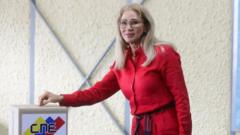The electoral council (CNE), accused of bias, reported the ruling party's success in winning the governorship in 23 out of 24 states and securing 82.68% of National Assembly votes. However, opposition leaders disputed these claims, suggesting that actual voter turnout was less than 15%.
María Corina Machado, the opposition's figurehead, asserted a boycott against the elections and criticized the government’s approach, claiming that over 85% of the populace rejected the regime’s legitimacy. While the CNE announced a 42.6% turnout, independent journalists noted a stark lack of voter presence at polling places.
With a backdrop of arrests targeting opposition figures, including Machado's ally Juan Pablo Guanipa, the elections have drawn global scrutiny. Commentators point to recent electoral conduct as indicative of long-standing issues with Venezuela’s electoral integrity. For instance, in the last presidential election held in July, the CNE faced international backlash for not disclosing detailed results, stirring distrust among voters and observers.
Despite the challenges, a minority of opposition politicians chose to participate, arguing for resistance through voting. Some traditional opposition figures, including Henrique Capriles, claimed that their presence in elections was crucial for resilience against the ruling party. Their participation has been met with criticism from fellow opposition leaders, including Machado, who see it as a betrayal of the boycott strategy.
In this electoral cycle, the Maduro administration also sought to assert its claim over the disputed Essequibo region, conducting symbolic voting, challenged by the Guyanian government. President Irfaan Ali described the act as opportunistic given that Venezuela lacks control over the territory.
The CNE’s reported triumph coupled with a polarized political landscape raises questions about Venezuela's ability to achieve political stability and democratic legitimacy in the foreseeable future, as calls for reform persist amidst oppressive political conditions.
María Corina Machado, the opposition's figurehead, asserted a boycott against the elections and criticized the government’s approach, claiming that over 85% of the populace rejected the regime’s legitimacy. While the CNE announced a 42.6% turnout, independent journalists noted a stark lack of voter presence at polling places.
With a backdrop of arrests targeting opposition figures, including Machado's ally Juan Pablo Guanipa, the elections have drawn global scrutiny. Commentators point to recent electoral conduct as indicative of long-standing issues with Venezuela’s electoral integrity. For instance, in the last presidential election held in July, the CNE faced international backlash for not disclosing detailed results, stirring distrust among voters and observers.
Despite the challenges, a minority of opposition politicians chose to participate, arguing for resistance through voting. Some traditional opposition figures, including Henrique Capriles, claimed that their presence in elections was crucial for resilience against the ruling party. Their participation has been met with criticism from fellow opposition leaders, including Machado, who see it as a betrayal of the boycott strategy.
In this electoral cycle, the Maduro administration also sought to assert its claim over the disputed Essequibo region, conducting symbolic voting, challenged by the Guyanian government. President Irfaan Ali described the act as opportunistic given that Venezuela lacks control over the territory.
The CNE’s reported triumph coupled with a polarized political landscape raises questions about Venezuela's ability to achieve political stability and democratic legitimacy in the foreseeable future, as calls for reform persist amidst oppressive political conditions.


















